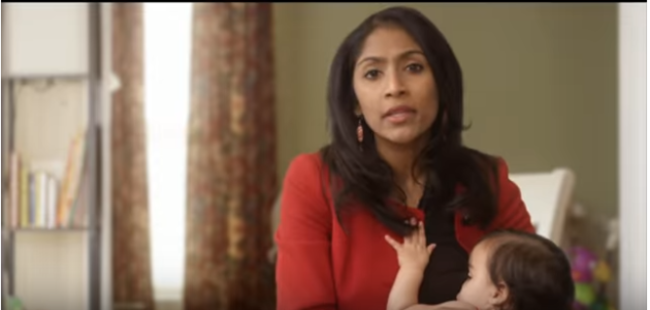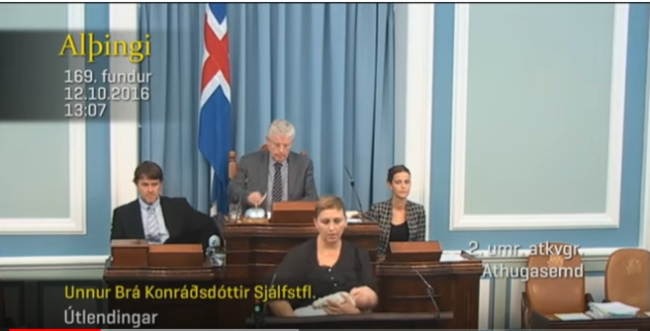WHEN WE TALK about women in politics, we often forget about some of the real obstacles that they face to get themselves there. Obstacles like a lack of maternity leave for example. Or being a working mother.
Maryland gubernatorial candidate Krish Vignarajah is the latest to shed light on the issue with her campaign video showing her breastfeeding her daughter Alana.
It’s interesting because what are you going to be more shocked about? A woman breastfeeding her child on camera in 2018 or that Maryland has never had a female governor? Or the fact that nearly half of American states (22) have never had a female governor?
It’s a simple video which is challenging the over-sexualised image of breasts and showing that they’re not sexual organs but instead functioning parts of a human body. It’s showing us a real mother and it’s not hidden away from view or shamed. It’s just there, exactly as it should be.
Of course you could say that Vignarajah is just using the breastfeeding to get attention but hey, would you be paying attention to the Governor race in Maryland otherwise? It’s a conversation point which leads into a conversation about something a bit deeper.
What’s interesting is that this shouldn’t be groundbreaking in 2018. However, every time a female candidate does it, it makes headlines.
It happened in Australia in 2017, in New Zealand and in Iceland in 2016 where Unnur Brá Konrádsdóttir breast fed her child while giving a speech. All of these countries became more family friendly for their politicians and this is something which should be actively encouraged.
Ireland on the other hand is failing it’s female TDs and councillors. In the last general election we elected the largest amount of female TDs in our history with a total of 35 women now in the Dáil.
We all patted ourselves on the back and told ourselves how great we were because gender quotas had worked and the Dáil was that bit more equal. I mean men still outnumber women 3 to 1 but it was a great step forward.
However, if we want to get more women, particularly young women into the Dáil then we need to start addressing issues that they’re facing. For example, female TDs and Councillors aren’t entitled to maternity leave.
The law in Ireland currently states that the minimum amount of maternity leave that must be given in Ireland is 26 weeks. Although interestingly this leave does not have to be paid by the employer, they can choose to if they want to. The pregnant person is paid through social welfare which is €240 per week of leave.
Now the argument can be made that a TDs salary is high enough, they don’t need paid maternity leave. It’s a poor argument given that any other pregnant person in Ireland who earns that salary would still be given maternity leave. Councillors earn about €16,500 before tax so that argument doesn’t work for them either.
Not giving maternity leave to TDs and Councillors prevents women from getting into politics. Why would you choose to go into a career which actively hampers your life choices?
You’ve plenty of examples too. In an interview with the Independent in January of this year Fianna Fáil TD Niamh Smyth told of how she couldn’t get from her constituency in Cavan to the Dáil because of having a Caesarean section which meant she couldn’t drive for 2 weeks.
Then once you do go back to the Dáil you’re relying on other people like family or friends to look after your kids. Maybe you have to stop breast feeding or you’re more tired because of late night feeds or illness or anything really. If you’re a rural TD then these problems are even worse. It’s a ridiculous situation that we’re placing our representatives in.
A male representative doesn’t have to worry about whether having a baby will impact his ability to represent his constituents or how he’ll make ends meet or what happens if something goes wrong with the birth or afterwards. A male TD doesn’t have to choose between their career and their family most of the time.
If we want to revolutionize our political system then we actively need to encourage younger women to get involved in politics. We shouldn’t punish them if they want to have kids too.
We shouldn’t be placing more obstacles in front of them because if they suffer then we suffer too. The last vote on this matter was in 2013 where it was roundly defeated. Perhaps it’s time we gave it another go.














COMMENTS